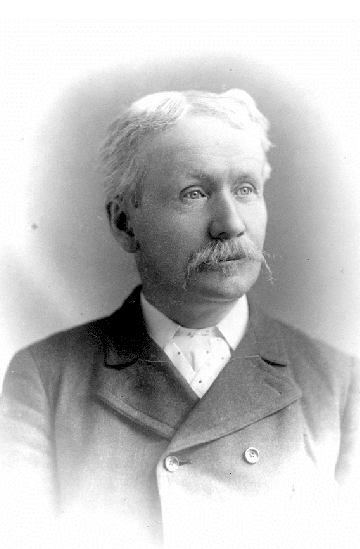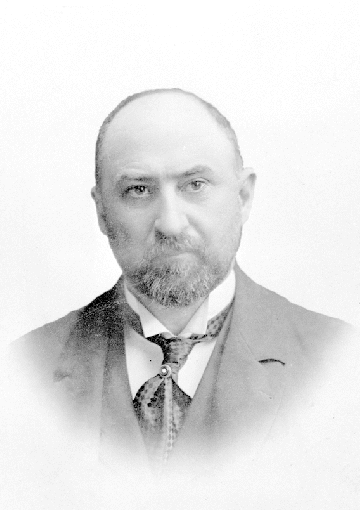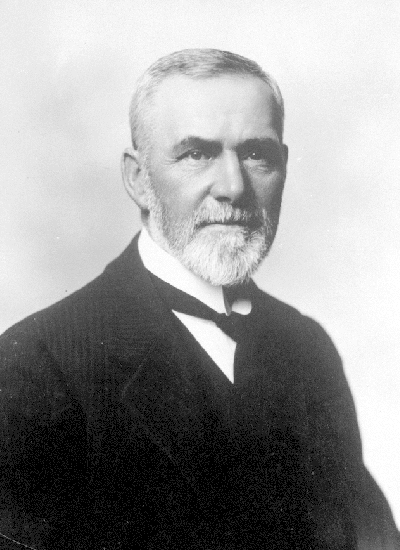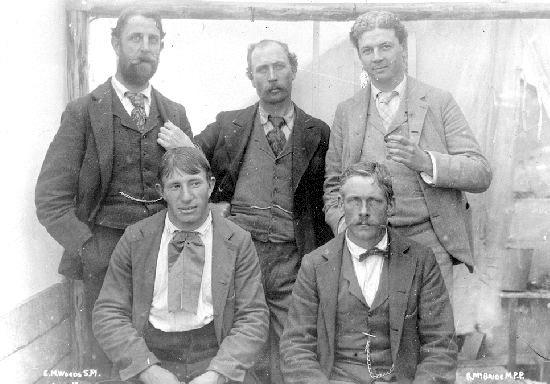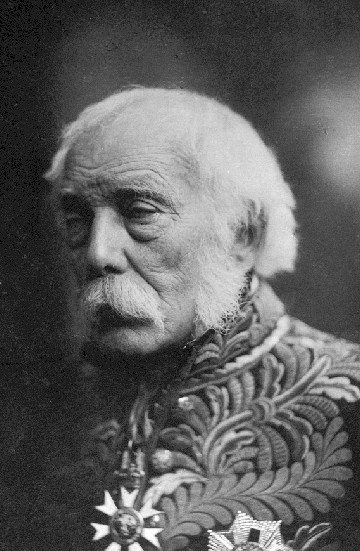
BC's juiciest political scandal
Plum rot and anti-Asian legislation
Lotbiniere's BC experience
BC's
"juiciest political scandal"2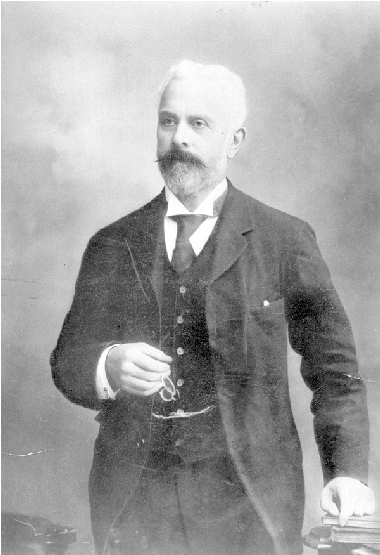
Sir
Henri Joly de Lotbinière's predecessor, Thomas Robert McInnes
is considered BC's most controversial Lieutenant Governor .
While
the political situation in BC at the time of his governship was
turbulent, McInnes worsened the situation by dismissing and appointing
premiers without the support of the legislature or the
people.
The first premier to experience the swing of McInnes' axe was John H. Turner,
whom McInnes removed from office 8 August 1898. Although
Turner
was having difficulties forming a government amidst all the political
turmoil, he "just managed to limp along;"3
and his
dismissal was widely criticized. In fact, the Dominion even
warned McInnes not to meddle as much in provincial politics, but "the Governor was not a man who
cared to be dictated to by eastern capitalists concerning western
political situations."4
John Turner
McInnes appointed Robert Beaven to replace Turner, but as Beaven did not even have a seat in the House, McInnes was forced to appoint his second choice, Charles Semlin as the new premier on 15 August 1898. However, when Semlin began to have problems in the House, McInnes demanded he call elections and when Semlin refused, and McInnes abruptly dismissed him, and appointed his opponent, the unpopular Joseph Martin. Martin's term as premier was the shortest in BC history and he was ousted with a vote of non-confidence passed 30-1 on 14 June 1900.
Charles Semlin
Wide public discontent with McInnes
was apparent:
-
after Martin's appointment as premier, McInnes arrived to prorogue the assembly and every MLA, aside from Martin and the speaker, walked out.5
-
the next premier, James Dunsmuir wrote to Laurier condemning McInnes' actions as "contrary to the principles, usages, and customs of constitutional government."6
Joseph Martin
-
the Provincial Rights Association published a decree in which they wrote:
-
"Thomas R. McInnes has committed a series of outrages on the constitution of this Province, and therefore, on the people, beginning in 1898 and not having ended at the present hour...No man who is the subservient tool of a despotic Lieutenant Governor, who is not responsible to the people, can be a true or sincere friend of the people. The people's rights have been grossly invaded and trampled upon by Thomas R. McInnes, Lieutenant Governor of this Province and by his co-conspirators.The Prime Minister of the Dominion, Sir Wilfred Laurier has refused to assist Thomas R. McInnes, the head, and Joseph Martin, the tail of this rump creation, and the Provincial Rights Association which steadfastly opposes all tyrants, be they representatives of the Crown, or of the people, will hunt them from post to pillar until avenging justice shall have secured their political strangulation."7
Full text of Provincial Rights Association Decree
In
response, Laurier advised
McInnes to resign on 19 June 1900 and when McInnes refused, Laurier
unprecedentedly dismissed him from office the following day and
appointed Lotbinière as his replacement.
A Happy Solution
Lotbinière arrived in Victoria with his wife, Lady Marguaretta, at the end of June 1900. He was received with mixed emotions. Some, such as the Provincial Rights Association, welcomed Lotbinière as "a happy solution to the... perplexing problems"8 of politics in BC. Others, however, viewed the French politician as a stranger to BC politics, imposed "as a sort of disciplinary measure"9 on the Province.
When Premier James Dunsmuir wrote to Laurier questioning his choice, Laurier responded, kindly informing Dunsmuir:
As it turned out, Laurier had been right. Shortly after his arrival, the Colonist described Lotbinière as
"Of rather more than average height; slightly built, with silvery gray hair, moustache and whiskers, and a charming ease and grace of manner, Sir Henri looked a fit occupant of the important post to which he has been assigned."11
The combination of Lotbinière's experience, social graces, "many admirable qualities," enabled him to impress politicians and people alike. Over the next six years, Lotbinière "proved himself so capable an administrator, so apt in constitutional matters and such a courteous and genial gentleman that he won friends on every side and, before his term was up, citizens were begging authorities to allow him to remain." 12
Lieutenant Governor of BC:"Otium com dignate"?
Lotbinière was a man with a great deal of political experience prior to his appointment in BC.
Gisèle Samson of the Association Historique Francophone de Victoria states the following:
Sir Henri-Gustave a déjà mené une longue carrière politique active et variée d'une quarantaine d'années quand il arrive en C.-B. C'est un homme cultivé... un conseiller constitutionnel précieux pour tout jeune politicien.13
[ Sir Henri-Gustave had already led a long, active and varied political career over the forty years prior to his arrival in B.C., he was an educated and cultured man... an invaluable constitutional adviser for any young politician. my translation]
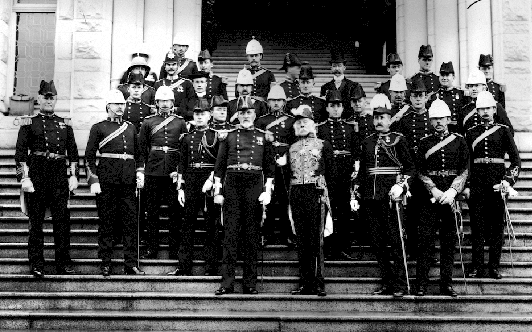
Lotbinière on the steps of the Legislative Assembly
In spite of his many years of experience at both provincial and federal levels of politics, the chaotic state of politics in British Columbia would prove challenging for Lotbinière. The Legislative Assembly seemed to experience crisis after crisis, and even when conditions were calm, the lack of party politics and party discipline made the political climate unstable and unproductive. Lotbinière expressed his frustration with the situation in a letter to his son, written in May 1902:
La session a commence le 19 février. 3 mois lundi et je ne sais quand elle se terminera. Les partis sont presqu’également divisés, mais j’ai tort d’employer le mot partis, dans le présent cas, car ici, Conservateurs et Libéraux se trouvent mêlés dans les deux camps, comme des fleurs dans un bouquet.
Avec notre système Parlementaires Anglais, il faut absolumment (sic) la Discipline de partis. Il est un utopie que de rêver un gouvernement parlementaire stable là où ceux qui le supportent refusent de prendre la responsabilité de ses actes. Comme de raisons, il y a une limite à toute chose humaine et il y a des cas où un membre est justifié de voter contre son parti, mais il faut de bonnes raisons pour cela…14
[The session began on the 19th of february which is three months ago monday and I do not know when it will conclude. The parties are nearly equally divided, but I am not correct in using the word party at the present time, as here, there is a mix of Conservatives and Liberals in both camps, like a bouquet of flowers. With our British Parliamentary system, party Discipline is absolutely necessary. Stable parliamentary government is a utopian dream in a place where even supporters of the idea refuse to take responsibility for their actions. Like reason, there is a limit to every human creation and there are times when a member would be justified in voting against his party, but there needs to be good reasons for that... (my translation)]
By Christmas of the same year, the political situation had improved little, which Lotbinière expressed to his son in a letter:
24 December 1902
Our political horizon here is still very cloudy and I am hoping against hope how it will end.15
Plum rot and anti-Asian legislation
The Hon. James Dunsmuir reluctantly became premier under the previous Lieutenant-Governor, Thomas R. McInnes, and was tired of the "mundane matters" he had to deal with as part of his position, such as reports plum rot and requests for horses and buggies.16 Although Dunsmuir and Lotbinière got along well, they disagreed on a "hot" topic: the treatment of the increasing amount of Asians living in British Columbia. While Lotbinière was friendly and welcoming towards Asian immigrants and workers, employing three Chinese servants himself,17 Dunsmuir continuously tried to push anti-Asian legislation through the Legislature and found that Lotbinière had a "distressing habit of disallowing anti-Asian legislation."18
James Dunsmuir
Dunsmuir willingly resigned just
following the
royal visit on 21 November 1903. Lotbinière
described his
resignation as part of the « grand
ménage » he was attempting on BC politics.19
E.G. Prior and Company
After Dunsmuir's resignation,
Lotbinière called on
Edward Prior, an engineer and business man prior to
becoming a politician, to form a government. Unfortunately
Prior would have the
second shortest term as premier in BC history after a
scandal that resulted in Lotbinière dismissing him as
premier; an act that
reminded the province of the Semlin-McInnes situation.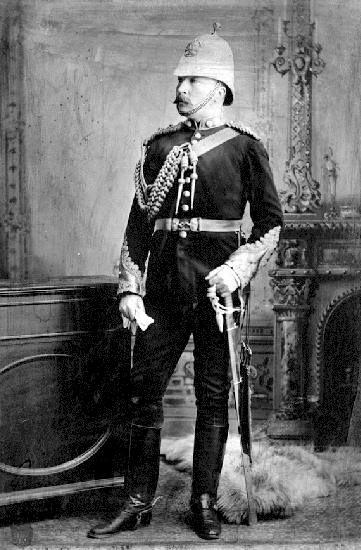
Prior and Lotbinière initially enjoyed a good relationship. Lotbinière disagreed with Prior over a bill concerning railway construction (Bill 16) but correspondences between the two men remain cordial.20
However,
when Lotbinière found
out that Prior had awarded his own company, E.G. Prior and Co. a
"substantial government contract"21
to supply hardware for the Chimney
Creek Bridge
even though the company had been the lowest bidders,
Lotbinière
reacted immediately. He dismissed Prior's outlandish claims that he
felt he was acting in the best interest of the province and declared in
a letter that he was "unable to
continue to feel confidence in [Prior's] judgement."22
Edward Prior
Prior, however, refused to resign, claiming that Lotbinière, like McInnes before him, was "violating the true principles of parliamentary independence of members, and above all, of ministers of the crown,"23 by dismissing him. His claims fell on deaf ears and Lotbinière subsequently appointed a promising young politician as premier of the Province: Richard McBride.
The Youngest Member of the House
When
Lotbinière
appointed the young Richard
McBride as premier, the political situation
in BC was "as
ugly as ever."24
But McBride was
popular in both political and social circles, and Lotbinière
had
high hopes for the 32-year old politician. He wrote his impressions of
McBride in a letter to his son:
12 October 1903
Our prime minister is the youngest member in the House and I think he
is well disposed to do what is right. I treat him as if he were my son
as far as advice and encouragement can do it.25
Young McBride (back far right) before becoming premier
Lotbinière stressed to McBride the importance of party politics and his sincere belief that "the system of constitutional government would collapse" in BC with the continued absence of proper party organization and discipline.26 McBride took his adviser's words to heart and, upon being appointed premier, announced that he was Conservative and that his Legislative Assembly would be run along party lines.27 Lotbinière was pleased, but hesitant, as many of McBride's close friends were not part of the Conservative party, and expected to still be invited to form the governement with McBride. However, to his adviser's delight, McBride held firmly to the idea shared by Lotbinière that political stability could only be achieved through clear party division and party discipline, and placed his surprised liberal colleagues in the opposition.28
Less than half a year after party
politics were
introduced in BC, Lotbinière again wrote about the situation:
17
Jan 1904
The Legislature
has resumed its
sittings and I am glad to say that so far the session is
satisfactory. I am very favourably impressed
with
the leader of the opposition, Mr MacDonald who shows firmness and
moderation in the control of his followers and I hope he will be able
to keep up the course he has started. The Government are
making a
very strong effort to re-establish the equilibrium in our finances...
May God help them to do honestly and fearlessly their duty. I
do
my best to encourage them and feel more hopeful for the future that I
have ever felt since I came here.29
Lotbinière had been right all along, what BC needed was
party
discipline. With party discipline came stability, and McBride
remained Premier of BC until 1915.
Finally! La fin.
Because of his success in BC,
Lotbinière was invited back
for a second term as Lieutenant-Governor,
a rare honour. Lotbinière, however,
declined. His
wife had died recently and he at 77 years old, his vision and health
deteriorating, he wanted to return to his family and gardens in
Québec.
Two years prior to the end of his term, Lotbinière wrote:
24 February 1904
I would be grateful when leaving next June could I feel that the
province is better off than when I came five years ago.30
Clearly, by the end of 1906, such
was the case. Under Lotbinière's guidance, the new
premier had taken BC politics
from a system functioning on "chaotic individualism"31
to
a stable Legislative Assembly that had firm party divisions and party
discipline. Lotbinière twice extended his term:
once to
open the Canadian Exposition in 1905, and finally, to host Prince
Arthur in the spring of 1906. Around that time, he wrote his
final letter to his son about his experience in BC:
22 March 1906
Prince Arthur will
be here next week. He will stay at Government House, great
banquet... It is our last function in BC.
I am sad to leave BC, our friends here, the daily work of my office, the responsability (sic) of my position as adviser to my advisers! I have the feeling that there is no more work for me after this, and nevertheless, strange to say, though my eyesight is leaving me and my memory for names and actual events is getting weak, my mind appears to expand instead of contract.
We are accustomed to say that we live... “day by day” and to think that it means we must not be “anxious for tomorrow” Lately I have thought it meant more than that... that we must do... all work allotted to us for that same day leaving no part of it unfinished.32
Lotbinière
towards the end of his term in BC
According to Marcel
Hamlin, University of
Ottawa, "It was unanimously agreed that Sir Henri had done much to
enhance the position of lieutenant governor by his kindly affability,
his natural elegance, his personal prestige, and his political
experience."33
Lotbinière left Victoria
quietly, declining
any sort of official ceremony. He died two years later, in
his
residence in Québec at the age of 79 after a long and
fruitful
political career, including a lasting impact on politics in British
Columbia.
Endnotes (click on number to return to place in text)
1. British Columbia Archives (hereafter BCA) Political correspondences of John Herbert Turner, MS-0471, file 112 and 113, telegraphs to Hon. James Dunsmuir from Laurier, 20 June 1900, 22 June 1900.
2.William Rayner, Images of History: Twentieth Century British Columbia through the Front Pages, (Victoria, BC: Orca Book Publishers, 1997), 8.
3.S.W. Jackman, The Men at Cary Castle: A Series of Portrait Sketches of the Lieutenant-Governors of British Columbia from 1871-1971, (Victoria, BC: Morriss Printing Company Ltd., 1972), 71.
4.William Rayner, British Columbia's Premiers in Profile: the good, the bad, and the transient, (Surrey, BC: Heritage House Publishing, 2000), 86.
5.Dr. Ed. Whitcomb, A Short History of British Columbia, (Ottawa: From Sea to Sea Enterprises, 2006), 24.
6.Rayner, British Columbia's Premiers in Profile, 91.
7.BCA, British Columbia Premiers' Papers, 1883-1933, GR-0441, box 15 file 3 no. 142, Horace F. Evans, Provincial Rights Association enclosing resolution commending the dismissal of Thomas McInnes as Lieut. Governor and the appointment of Sir Henry Joly de Lotbinière, 4 July 1900.
8.BCA, British Columbia Premiers' Papers, 1883-1933, GR-0441, box 15 file 3 no. 142, Horace F. Evans, Provincial Rights Association enclosing resolution commending the dismissal of Thomas McInnes as Lieut. Governor and the appointment of Sir Henry Joly de Lotbinière, 4 July 1900.
9.D.A. McGregor, They Gave Royal Assent ,(Vancouver: Mitchell Press Ltd., 1967), 42.
10.BCA, Political correspondences of John Herbert Turner, MS-0471, file 114, Wilfrid Laurier explains appointment of Lieutenant-Governor, 5 July 1900.
11.Jackman, The Men at Cary Castle, 79.
12. McGregor, They Gave Royal Assent, 42.
13. Gisèle Samson, Conférence de l'Association Historique Francophone de Victoria, Janvier 2008.
14. BCA, Mflm 11A (2) Sir Henri Joly de Lotbinière correspondence outward, Victoria Day 1902.
15.BCA, Mflm 11A (2) Sir Henri Joly de Lotbinière correspondence outward, 24 December 1902.
16. Rayner, British Columbia's Premiers in Profile, 94.
17. British Columbia, 1901 Census, online search through Vancouver Island History, http://vihistory.ca/content/census/1901/census1901.php?page=main.
18.Rayner, British Columbia's Premiers in Profile, 92.
19.BCA, Mflm 11A (2) Sir Henri Joly de Lotbinière correspondence outward, 22 November 1902.
20.BCA, British Columbia Premiers' Papers, 1883-1933, GR-0441, box 20 file 2 no. 92-94 Correspondences between Prior and Lotbinière concerning Bill 16, 21 April 1903- 30 April 1903.
21.Peter Murray, From Amor to Zalm: A Primer on B.C. Politics and its Wacky Premiers, (Victoria, BC: Orca Book Publishing, 1989), 58.
22.Rayner, British Columbia's Premiers in Profile, 99.
23.Rayner, British Columbia's Premiers in Profile, 99.
24.Rayner, British Columbia's Premiers in Profile, 99.
25.BCA, Mflm 11A (2) Sir Henri Joly de Lotbinière correspondence outward, 12 October 1903.
26.Rayner, British Columbia's Premiers in Profile, 101.
27. Whitcomb, A Short History of British Columbia, 30.
28.Murray, From Amor to Zalm, 68.
29.BCA, Mflm 11A (2) Sir Henri Joly de Lotbinière correspondence outward, 17 January 1904.
30.BCA, Mflm 11A (2) Sir Henri Joly de Lotbinière correspondence outward, 24 February 1904.
31.Rayner, British Columbia's Premiers in Profile, 101.
32. BCA, Mflm 11A (2) Sir Henri Joly de Lotbinière correspondence outward, 22 March 1906.
33.
Marcel
Hamelin, "Joly de Lotbinière, Sir Henri Gustave,"
in Dictionary
of Canadian Biography Online, http://www.biographi.ca/EN/ShowBio.asp?BioId=40931&query=
Click
the images to view them in
context.

